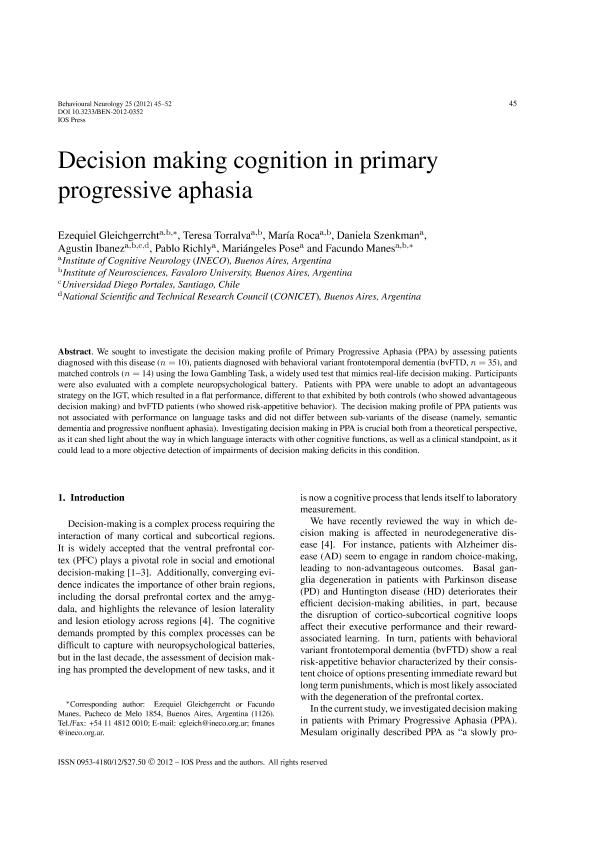Artículo
Decision making cognition in primary progressive aphasia
Gleichgerrcht, Ezequiel; Torralva, Teresa; Roca, María ; Szenkman, Daniela
; Szenkman, Daniela ; Ibañez, Agustin Mariano
; Ibañez, Agustin Mariano ; Richly, Pablo; Pose, Mariángeles; Manes, Facundo Francisco
; Richly, Pablo; Pose, Mariángeles; Manes, Facundo Francisco
 ; Szenkman, Daniela
; Szenkman, Daniela ; Ibañez, Agustin Mariano
; Ibañez, Agustin Mariano ; Richly, Pablo; Pose, Mariángeles; Manes, Facundo Francisco
; Richly, Pablo; Pose, Mariángeles; Manes, Facundo Francisco
Fecha de publicación:
01/2012
Editorial:
Hindawi Publishing Corporation
Revista:
Behavioural Neurology
ISSN:
0953-4180
Idioma:
Inglés
Tipo de recurso:
Artículo publicado
Clasificación temática:
Resumen
We sought to investigate the decision making profile of Primary Progressive Aphasia (PPA) by assessing patients diagnosed with this disease (n=10), patients diagnosed with behavioral variant frontotemporal dementia (bvFTD, n=35), and matched controls (n=14) using the Iowa Gambling Task, a widely used test that mimics real-life decision making. Participants were also evaluated with a complete neuropsychological battery. Patients with PPA were unable to adopt an advantageous strategy on the IGT, which resulted in a flat performance, different to that exhibited by both controls (who showed advantageous decision making) and bvFTD patients (who showed risk-appetitive behavior). The decision making profile of PPA patients was not associated with performance on language tasks and did not differ between sub-variants of the disease (namely, semantic dementia and progressive nonfluent aphasia). Investigating decision making in PPA is crucial both from a theoretical perspective, as it can shed light about the way in which language interacts with other cognitive functions, as well as a clinical standpoint, as it could lead to a more objective detection of impairments of decision making deficits in this condition.
Palabras clave:
Decision making
,
Primary Progressive Aphasia
Archivos asociados
Licencia
Identificadores
Colecciones
Articulos(SEDE CENTRAL)
Articulos de SEDE CENTRAL
Articulos de SEDE CENTRAL
Citación
Gleichgerrcht, Ezequiel; Torralva, Teresa; Roca, María; Szenkman, Daniela; Ibañez, Agustin Mariano; et al.; Decision making cognition in primary progressive aphasia; Hindawi Publishing Corporation; Behavioural Neurology; 25; 1; 1-2012; 45-52
Compartir
Altmétricas



